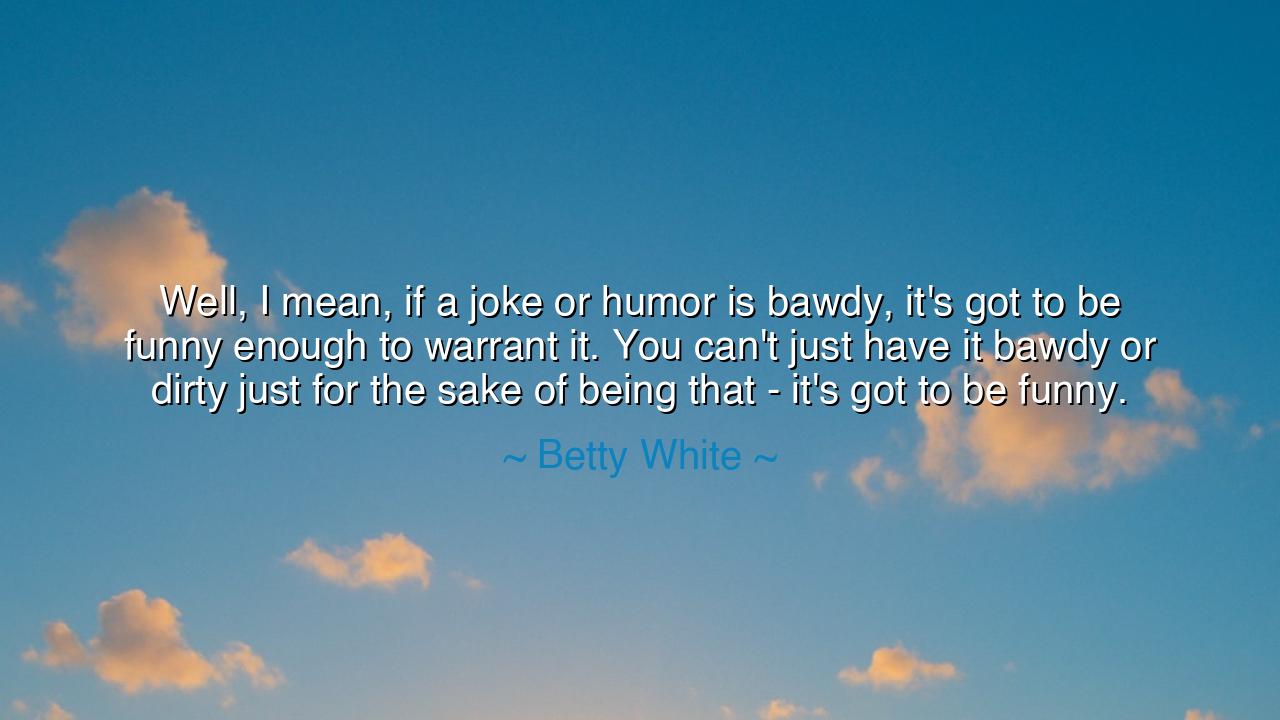
Well, I mean, if a joke or humor is bawdy, it's got to be funny
Well, I mean, if a joke or humor is bawdy, it's got to be funny enough to warrant it. You can't just have it bawdy or dirty just for the sake of being that - it's got to be funny.






When Betty White said, “Well, I mean, if a joke or humor is bawdy, it's got to be funny enough to warrant it. You can't just have it bawdy or dirty just for the sake of being that — it's got to be funny,” she was not merely offering a rule for comedy; she was teaching a truth about intention, balance, and wisdom in expression. Her words, simple and light on the surface, carry the weight of moral clarity — a lesson on the difference between freedom and vulgarity, between art that uplifts and art that merely shocks. Beneath her laughter was discernment, and within her humor, a reverence for the power of words.
Betty White lived and worked in an age where the boundaries of humor were constantly shifting — from the polite charm of early television to the unrestrained openness of modern media. Yet through it all, she understood a principle that the ancients would have admired: that wit is sacred when it serves truth or joy, but empty when it serves only impulse. To make a joke “bawdy,” to play with the daring edge of decency, is no sin — provided it is done with purpose and grace. What she warned against was the emptiness of vulgarity for its own sake, the kind of humor that seeks laughter without meaning, sensation without soul. True comedy, she taught, must earn its freedom.
This wisdom echoes the teachings of the Greek playwright Aristophanes, whose comedies were often outrageous, filled with satire, ridicule, and daring wordplay. Yet beneath his laughter lay the heart of a philosopher. He mocked to reveal truth, to expose hypocrisy, to cleanse the soul of pretense through the medicine of laughter. Betty White’s philosophy was much the same. Laughter, when pure, is a cleansing flame; but when aimless, it becomes smoke — irritating, not illuminating. The difference lies in intention. The bawdy joke that makes people laugh and think is art; the crude one that only shocks or degrades is noise.
There is also in Betty’s words a call to integrity of creation. Every artist, whether comedian or poet, is tempted by excess — to be louder, more daring, more sensational. But she reminds us that humor, like all art, must have discipline. It must rise from truth, empathy, and insight, not from the hollow desire to provoke. The same principle applies far beyond comedy: a leader’s boldness must serve justice, not ego; a writer’s shock must reveal, not simply offend. In every craft, restraint is the silent companion of mastery. Without it, even talent becomes chaos.
Consider the example of Mark Twain, who, like Betty White, was a master of sharp and often scandalous humor. Twain could wound with a word, yet he used his wit not to demean, but to awaken. His humor was daring, but never pointless. He once said, “Against the assault of laughter nothing can stand,” and he meant that laughter should be aimed against tyranny, ignorance, and hypocrisy — not against human dignity itself. Betty White’s belief mirrors that same moral compass: humor is a sword, and its wielder must know where to strike.
There is another, subtler layer to her wisdom: the power of joy married to responsibility. In her decades on screen, White made people laugh without cruelty, charm without pretense, and delight without debasement. She showed that humor could be mischievous and even risqué without losing its heart. Like the jesters of old who spoke truth to kings, she wielded laughter as a noble weapon — gentle in tone, fierce in purpose. To her, to make others laugh was an act of kindness, not conquest. That, too, is why she demanded that humor, even when bawdy, be worthy of its boldness.
Thus, the lesson of Betty White’s words is this: do nothing without meaning. Let your humor, your work, your speech, even your rebellion, be guided by purpose and grace. Freedom without wisdom is not freedom, but folly. If you must be bold, be bold for truth. If you must be daring, be daring for joy. Never seek to shock merely to be seen — for shock fades, but sincerity endures.
So, my listener, take this teaching to heart. Speak with honesty, laugh with kindness, and create with purpose. Let your wit be sharp but never cruel, your daring tempered by compassion. For as Betty White reminds us, the world does not need more noise — it needs laughter that heals, humor that enlightens, and courage that shines bright enough to warrant its place in the heart of humankind.






AAdministratorAdministrator
Welcome, honored guests. Please leave a comment, we will respond soon